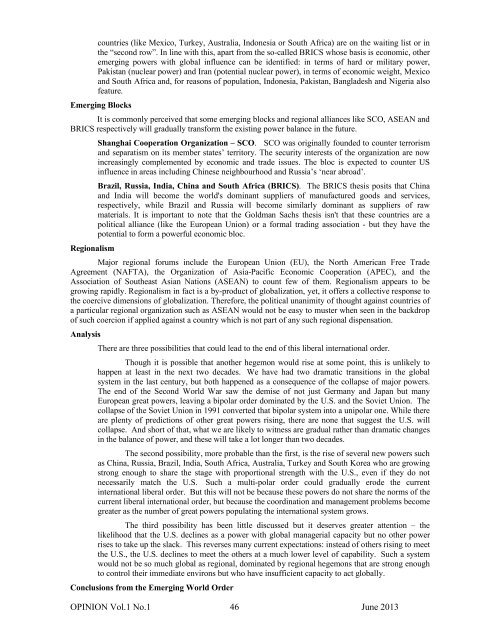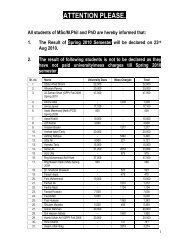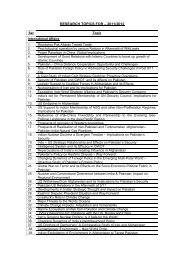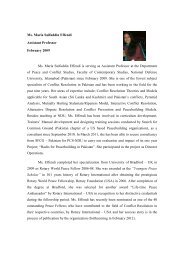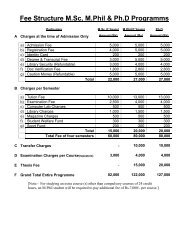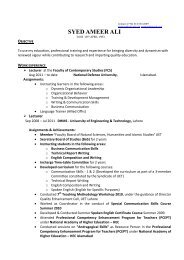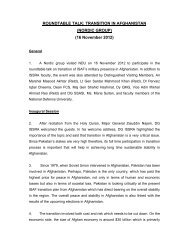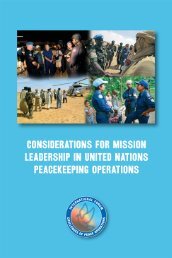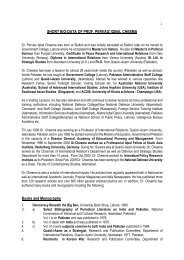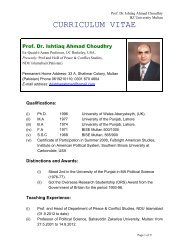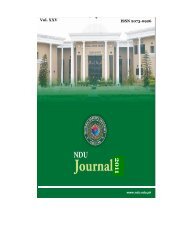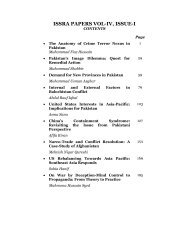OPINION Vol.1, No.1 June 2013 - National Defence University
OPINION Vol.1, No.1 June 2013 - National Defence University
OPINION Vol.1, No.1 June 2013 - National Defence University
Create successful ePaper yourself
Turn your PDF publications into a flip-book with our unique Google optimized e-Paper software.
countries (like Mexico, Turkey, Australia, Indonesia or South Africa) are on the waiting list or in<br />
the “second row”. In line with this, apart from the so-called BRICS whose basis is economic, other<br />
emerging powers with global influence can be identified: in terms of hard or military power,<br />
Pakistan (nuclear power) and Iran (potential nuclear power), in terms of economic weight, Mexico<br />
and South Africa and, for reasons of population, Indonesia, Pakistan, Bangladesh and Nigeria also<br />
feature.<br />
Emerging Blocks<br />
It is commonly perceived that some emerging blocks and regional alliances like SCO, ASEAN and<br />
BRICS respectively will gradually transform the existing power balance in the future.<br />
Regionalism<br />
Shanghai Cooperation Organization – SCO. SCO was originally founded to counter terrorism<br />
and separatism on its member states’ territory. The security interests of the organization are now<br />
increasingly complemented by economic and trade issues. The bloc is expected to counter US<br />
influence in areas including Chinese neighbourhood and Russia’s ‘near abroad’.<br />
Brazil, Russia, India, China and South Africa (BRICS). The BRICS thesis posits that China<br />
and India will become the world's dominant suppliers of manufactured goods and services,<br />
respectively, while Brazil and Russia will become similarly dominant as suppliers of raw<br />
materials. It is important to note that the Goldman Sachs thesis isn't that these countries are a<br />
political alliance (like the European Union) or a formal trading association - but they have the<br />
potential to form a powerful economic bloc.<br />
Major regional forums include the European Union (EU), the North American Free Trade<br />
Agreement (NAFTA), the Organization of Asia-Pacific Economic Cooperation (APEC), and the<br />
Association of Southeast Asian Nations (ASEAN) to count few of them. Regionalism appears to be<br />
growing rapidly. Regionalism in fact is a by-product of globalization, yet, it offers a collective response to<br />
the coercive dimensions of globalization. Therefore, the political unanimity of thought against countries of<br />
a particular regional organization such as ASEAN would not be easy to muster when seen in the backdrop<br />
of such coercion if applied against a country which is not part of any such regional dispensation.<br />
Analysis<br />
There are three possibilities that could lead to the end of this liberal international order.<br />
Though it is possible that another hegemon would rise at some point, this is unlikely to<br />
happen at least in the next two decades. We have had two dramatic transitions in the global<br />
system in the last century, but both happened as a consequence of the collapse of major powers.<br />
The end of the Second World War saw the demise of not just Germany and Japan but many<br />
European great powers, leaving a bipolar order dominated by the U.S. and the Soviet Union. The<br />
collapse of the Soviet Union in 1991 converted that bipolar system into a unipolar one. While there<br />
are plenty of predictions of other great powers rising, there are none that suggest the U.S. will<br />
collapse. And short of that, what we are likely to witness are gradual rather than dramatic changes<br />
in the balance of power, and these will take a lot longer than two decades.<br />
The second possibility, more probable than the first, is the rise of several new powers such<br />
as China, Russia, Brazil, India, South Africa, Australia, Turkey and South Korea who are growing<br />
strong enough to share the stage with proportional strength with the U.S., even if they do not<br />
necessarily match the U.S. Such a multi-polar order could gradually erode the current<br />
international liberal order. But this will not be because these powers do not share the norms of the<br />
current liberal international order, but because the coordination and management problems become<br />
greater as the number of great powers populating the international system grows.<br />
The third possibility has been little discussed but it deserves greater attention – the<br />
likelihood that the U.S. declines as a power with global managerial capacity but no other power<br />
rises to take up the slack. This reverses many current expectations: instead of others rising to meet<br />
the U.S., the U.S. declines to meet the others at a much lower level of capability. Such a system<br />
would not be so much global as regional, dominated by regional hegemons that are strong enough<br />
to control their immediate environs but who have insufficient capacity to act globally.<br />
Conclusions from the Emerging World Order<br />
<strong>OPINION</strong> <strong>Vol.1</strong> <strong>No.1</strong> 46 <strong>June</strong> <strong>2013</strong>


